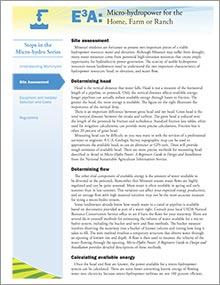

E3A Micro-hydro: Site Assessment
Reviewed
Missourians are fortunate to possess two important pieces of a viable hydropower resource: water and elevation. Learn about these two important characteristics of hydropower in this guide.

Fire and Emergency Services Company Officer, Sixth Edition Manual
New $67 to $79
This manual provides emergency services personnel with skills needed to reach the performance requirements of NFPA 1021. The text is written for Level I and Level II fire officers and fire officer candidates. Its goal is to provide candidates and current company officers with the knowledge needed to develop safe, efficient and effective leadership skills.
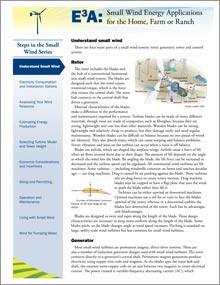
E3A Small Wind: Understand Small Wind
Reviewed
Editor’s note
The following abstract describes a publication that is only available as a downloadable PDF.

E3A Understanding Energy: Net Metering Electrical Energy Generators
Reviewed
Editor’s note
The following abstract describes a publication that is only available as a downloadable PDF.

E3A Small Wind: Estimating Energy Production
Reviewed
Editor’s note
The following abstract describes a publication that is only available as a downloadable PDF.

E3A Understanding Energy: Understanding Your Energy Consumption and Expenses
Reviewed
Editor’s note
The following abstract describes a publication that is only available as a downloadable PDF.
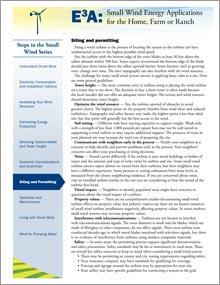
E3A Small Wind: Siting and Permitting
Reviewed
Editor’s note
The following abstract describes a publication that is only available as a downloadable PDF.

E3A Understanding Energy: Importance Scale of Alternative Energy Objectives
Reviewed
Editor’s note
The following abstract describes a publication that is only available as a downloadable PDF.

E3A Small Wind: Wind for Pumping Water
Reviewed
Editor’s note
The following abstract describes a publication that is only available as a downloadable PDF.

E3A Anaerobic Digesters: Estimate Potential
Reviewed
Editor’s note
The following abstract describes a publication that is only available as a downloadable PDF.

E3A Farm Energy: Energy-Saving Practices for Dairy Operations
Reviewed
Editor’s note
The following abstract describes a publication that is only available as a downloadable PDF.

E3A Anaerobic Digesters: Maintenance
Reviewed
Editor’s note
The following abstract describes a publication that is only available as a downloadable PDF.

E3A Solar Hot Water: Conservation and Efficiency
Reviewed
Editor’s note
The following abstract describes a publication that is only available as a downloadable PDF.

E3A Solar Electricity: Building and Site Assessment
Reviewed
Answer these questions to see if a solar electric system will work for you. Learn the importance of roof angle, condition, orientation, size and sun exposure.

E3A Solar Hot Water: Costs
Reviewed
Editor’s note
The following abstract describes a publication that is only available as a downloadable PDF.

E3A Solar Electricity: System Components
Reviewed
Learn about parts of a solar electric system, including batteries, charge controllers, crystalline silicon, inverters, meters and photovoltaic materials.

E3A Home Energy: Gas Appliances
Reviewed
Editor’s note
The following abstract describes a publication that is only available as a downloadable PDF.

E3A Home Energy: Insulating Side Walls
Reviewed
Editor’s note
The following abstract describes a publication that is only available as a downloadable PDF.

E3A Solar Hot Water: Solar Hot Water Collector Sizing Worksheet
Reviewed
Editor’s note
The following abstract describes a publication that is only available as a downloadable PDF.

E3A Solar Electricity: Installation
Reviewed
Thinking about installing a solar electric system? Read this guide to learn what to consider — from checking local building codes to comparing bids — when selecting a solar electric system and installer.

E3A Home Energy: Storm Windows
Reviewed
Editor’s note
The following abstract describes a publication that is only available as a downloadable PDF.
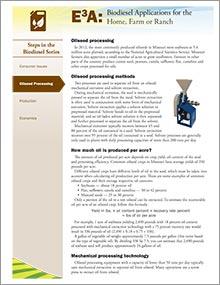
E3A Biodiesel: Oilseed Processing
Reviewed
Editor’s note
The following abstract describes a publication that is only available as a downloadable PDF.

E3A Understanding Energy: Energy Pyramid
Reviewed
Editor’s note
The following abstract describes a publication that is only available as a downloadable PDF.

E3A Home Energy: Condensation Control
Reviewed
Editor’s note
The following abstract describes a publication that is only available as a downloadable PDF.
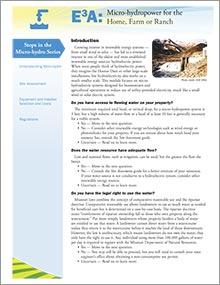
E3A Micro-hydro: Introduction
Reviewed
A micro-hydroelectric system for your home, farm or ranch can reduce your use of utility-provided electricity. Learn about the water and power needs of a micro-hydro system in this guide.